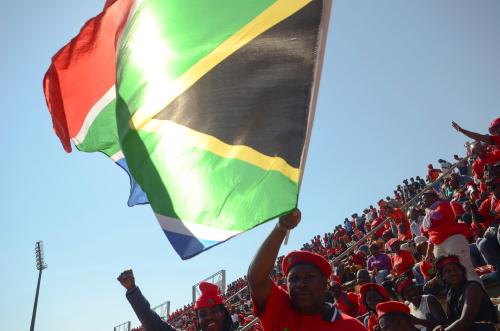Is the party of Nelson Mandela, which has governed South Africa since 1994, losing its grip on voters? Local elections on August 3 may tell us. They may also say something important about the country’s social and economic path.
As in many other countries, South African local elections are less about their ostensible purpose—electing governments in 278 municipalities—than a test of support for national parties. They may signal whether the next national election, in 2019, will be another foregone conclusion for the governing African National Congress (ANC) or the most competitive in the country’s democratic history. They will also decide whether the ANC retains its hold on all but one of the eight metropolitan councils that govern the major cities—which is why these local elections are attracting more interest than most national ballots.
If opposition politicians and a media that sympathizes with them are right, the ANC is headed for a crushing blow. Just two years ago, in the 2014 national election, the ANC’s vote in three big cities dropped to slightly above or below 50 percent. Similarly, the opposition’s optimism is fuelled by hundreds of local by-elections (held when councillors vacate their seats) that show a swing from the ANC to the largest opposition party, the Democratic Alliance (DA). And it reached unprecedented levels when polls showed the DA leading the ANC in Nelson Mandela Bay in the Eastern Cape province and Joburg and Tshwane (Johannesburg and Pretoria) in Gauteng, the country’s economic hub.
Why is the ANC apparently in trouble and how much trouble is it in?
On the first score, the excitement centers on only three or, at most, four contests (a third Gauteng metropolitan council, to Johannesburg’s East, has been targeted by the opposition although it was not considered a possible ANC loss before the campaign). There is little evidence that the ANC is in trouble elsewhere. In fact, even if the opposition achieves its target, the ANC will win well over 50 percent of the vote across the country.
This contrast between the hotly contested big cities and the rest shows that the more voters are integrated into the formal economy, the more the tide is running against the ANC. This reflects the development of the economy and society since 1994.
When South Africa negotiated a democratic constitution, it addressed the denial of citizenship rights to the majority. But it did not address its symptoms—the dominance of the economy and society by a few.
South Africa in 1994 was controlled by an exclusive club, to which only whites could belong. Democracy opened it to some black members but it remains exclusive: the economy (and other social institutions) still serve the few, but without the racial barriers.
The society is still divided between insiders and outsiders. The insiders are now black and white, but the outsiders are still almost exclusively black. Some black people participate as workers, managers, professionals, and sometimes owners in a formal economy that had barred them but the rest of the racial majority remains excluded. And so a growing fault line has emerged between the politics of the insiders and outsiders. The former is concerned with the health of the economy and checking government power—the latter is dominated by patronage politicians who distribute largesse to those shut out of the market.
The division runs through the ANC, in which factions wedded to the two political styles compete. But it also costs it support in the cities and particularly in the new black middle class which increasingly sees the ANC’s patronage camp as grubby and corrupt. Many in the black middle class also feel they are not equal members of the insider club—that they enjoy opportunities previous black generations were denied but encounter the same white racial biases. Many of these voters gravitated to the Economic Freedom Fighters, a party of former ANC youth leaders that is seen as left-wing but campaigns primarily against white dominance of business and the professions.
It is this trend that fuels opposition hopes. If they are realized, the result will confirm the widening gap between insiders and outsiders, between the politics of the urban core and the periphery and countryside. In the 2014 election, the ANC vote dropped by 10 percentage point in Gauteng, the country’s most urban, middle class, area. Already, a national government that wins almost two-thirds of the vote encounters so much urban middle class hostility that few public commentators dare praise it; outside the urban core it continues to dominate elections and social life. The election could confirm this gulf.
How much ground will the ANC lose in the cities? Urban disaffection with the ANC’s patronage politicians is more pronounced among the middle class. ANC voters may be horrified by its current leaders but many identify with its history and hope the “ANC of old” will reappear. And because the insider-outsider divide runs through the ANC, some who reject patronage politics continue to support its insider wing which is, predictably, stronger in more urban and middle class areas. These factors may stem the anti-ANC tide.
The accuracy of the polls is in doubt—they use telephone interviews which may exclude poorer ANC voters. But they do show many undecided votes. These are almost certainly ANC voters who are unhappy but cannot decide whether to break with it. This trend is not new, though: In previous elections, ANC support increased sharply in the last days of the campaign as disillusioned supporters decide to remain in their political home.
The outcome in the battleground urban areas will depend on whether they do this again or finally abandon their party. If they do make the leap, the ANC may lose the urban areas for a very long time. Whether that produces a growing divide between town and country or prompts voters outside the big cities to bolt the ANC, this will dent its electoral dominance and herald a more competitive, less predictable, politics.




Commentary
South Africa’s local elections may augur a political shift
August 2, 2016